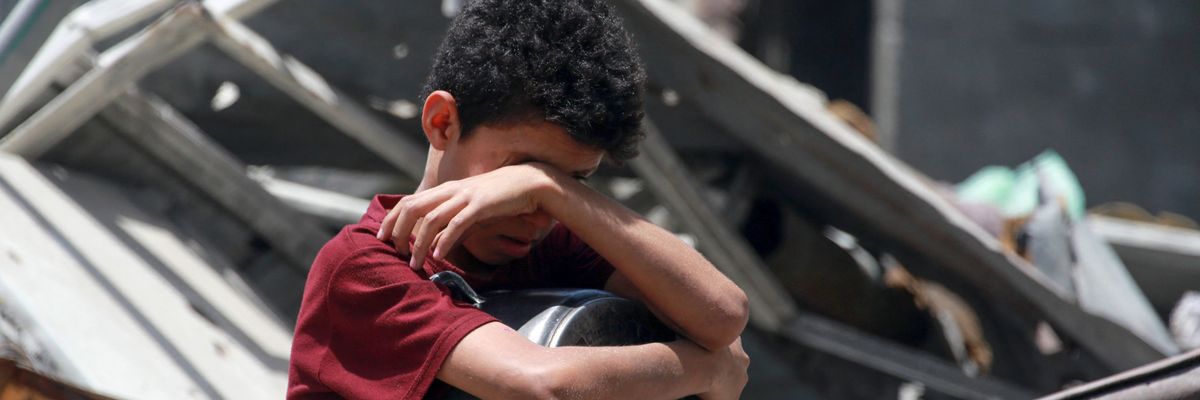As Israeli leaders were split over a plan to allow a "minimal" amount of aid into Gaza on Monday, Palestinian and global civil society groups issued a call for an international humanitarian mission that would go much further in fighting the looming famine across the enclave.
With the World Food Program and the United Nations Relief and Works Agency for Palestine Refugees in the Near East having "exhausted their reserves," more than 750 international groups joined "Unified Call to Confront Famine" and ensure the blockade stopping more than 3,000 food aid trucks and 116,000 metric tons of food are allowed into the enclave.
"We are witnessing, in real time, the deliberate starvation of a civilian population as a method of warfare," said Human Rights Watch (HRW), which also joined the call, in a statement. "Over 2 million Palestinians in Gaza are living in famine."
The group echoed an address by Tedros Adhanom Ghebreyesus, director-general of the World Health Organization (WHO), at the World Health Assembly on Monday in Geneva.
"The risk of famine in Gaza is increasing with the deliberate withholding of humanitarian aid," said Tedros. "The WHO has said around a quarter of the 2.1 million population in Gaza are facing 'a catastrophic situation of hunger, acute malnutrition, starvation, illness, and death' due to the Israeli blockade."
With aid that is "ready and waiting to enter Gaza" entirely blockaded by Israel since March 2, just before the Israel Defense Forces (IDF) broke a temporary cease-fire, civil society groups said states should join a "Diplomatic Humanitarian Convoy to Gaza through the Rafah Crossing."
In the convoy, official diplomatic missions would accompany thousands of aid trucks into Gaza, coordinating with the United Nations and the government of Egypt.
"Inaction will lead to mass death by starvation, enable further grave illegalities, and undermine the international legal system."
Supporting groups noted that governments that are "complicit in the ongoing atrocities," such as the U.S., the top international IDF funder, and called on "individual diplomats, parliamentarians, and ministers from those countries to join the convoy in their personal capacities." They also called on international media outlets to join—"to bear witness, to document the famine, and to expose the blockade starving Gaza."
"This is a human imperative," said HRW. "A Diplomatic Humanitarian Convoy would mark a historic step to break the siege, end the starvation, and affirm the world's rejection of hunger as a weapon of war."
The call came a day after Israeli Prime Minister Benjamin Netanyahu said the government's "greatest friends in the world" had made clear that they "cannot accept images of hunger, mass hunger."
Images of Palestinians in Gaza suffering from a lack of food, medicine, water, and other aid have been widely available since long before the current blockade, but Netanyahu's comments suggested that allies like the U.S. government have applied pressure to allow aid into the enclave.
On his trip to the Middle East last week, U.S. President Donald Trump said the U.S. would have the looming famine in Gaza "taken care of."
The Integrated Food Security Phase Classification (IPC), a United Nations-backed food insecurity initiative, said last week that at least 244,000 people in Gaza are facing Phase 5-level hunger, defined as "extreme deprivation of food."
"Starvation, death, destitution, and extremely critical levels of acute malnutrition are or will likely be evident," said the IPC.
The entire enclave is in Phase 4, which is characterized by "large food consumption gaps... very high acute malnutrition and excess mortality."
Aid and medical workers are struggling to treat thousands of children who have been diagnosed with acute malnutrition.
"We currently are lacking nutrition rehabilitation supplies and equipment, including pharmaceuticals," said Richard Peeperkorn, WHO representative in the occupied Palestinian territories. "Because of the blockades, supplies are dwindling rapidly."
Nutritionist Rana Soboh told The Associated Press Monday that she treated a mother who had fainted while breastfeeding her newborn after having gone days without eating.
The next day Soboh met a mother of a malnourished 1-year-old boy who weighed just 11 pounds, having lived his entire life during Israel's bombardment of Gaza and the near-total blockade that began in October 2023 in retaliation for a Hamas-led attack.
"He hadn't grown any teeth," the AP reported. "He was too weak to cry. The mother was also malnourished, 'a skeleton, covered in skin.' When the mother asked for food, Soboh started crying uncontrollably."
A U.N. official said Monday that under Netanyahu's plan to provide "minimal" aid, 20 aid trucks carrying food was expected to enter Gaza; before Israel began its assault on Gaza, about 500 trucks entered the enclave per day.
Israeli National Security Minister Itamar Ben-Gvir has objected to the tiny amount of food that may soon enter Gaza, saying it will "fuel Hamas and give it oxygen."
Netanyahu said the plan would be a "bridge" to a new aid system in which a private foundation and U.S. security contractors would distribute humanitarian assistance. The U.N. has rejected the proposal, saying it is "at odds with the DNA of any principled humanitarian organization."
HRW said the call for all humanitarian aid to enter Gaza in diplomatic convoy was grounded in "international law, shared morality, the Genocide Convention, the International Court of Justice's provisional measures, [and] the U.N. Charter."
"Inaction," said the group, "will lead to mass death by starvation, enable further grave illegalities, and undermine the international legal system."




